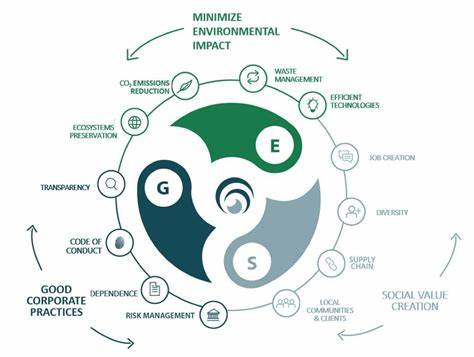The ESG Industry
25/11/2024 10:22

Environmental, Social, and Governance (ESG) refers to a set of standards used to evaluate a company's impact on the world and its operational practices. ESG criteria help investors and stakeholders assess how a company manages risks and opportunities related to environmental, social, and governance issues
The ESG Industry: A Comprehensive Overview
Environmental, Social, and Governance (ESG) refers to a set of standards used to evaluate a company's impact on the world and its operational practices. ESG criteria help investors and stakeholders assess how a company manages risks and opportunities related to environmental, social, and governance issues? | IBM](https://www.ibm.com/topics/environmental-social-and-governance).
Environmental Factors
Environmental criteria consider how a company performs as a steward of nature. This includes:
- Climate Change: Efforts to reduce carbon emissions and mitigate climate change impacts? | IBM](https://www.ibm.com/topics/environmental-social-and-governance).
- Resource Management: Efficient use of resources like water and energy.
- Waste Management: Proper disposal and reduction of waste.
- Biodiversity: Protection of ecosystems and wildlife.
Social Factors
Social criteria examine how a company manages relationships with employees, suppliers, customers, and the communities where it operates. This includes:
- Labor Practices: Fair wages, safe working conditions, and employee rights? | IBM](https://www.ibm.com/topics/environmental-social-and-governance).
- Human Rights: Ensuring that the company respects human rights and avoids complicity in human rights abuses? | IBM](https://www.ibm.com/topics/environmental-social-and-governance).
- Community Engagement: Positive contributions to the community and social well-being? | IBM](https://www.ibm.com/topics/environmental-social-and-governance).
- Product Responsibility: Ensuring products are safe and ethically produced? | IBM](https://www.ibm.com/topics/environmental-social-and-governance).
Governance Factors
Governance deals with a company’s leadership, executive pay, audits, internal controls, and shareholder rights. This includes:
- **Board Composition**: Diversity and independence of the board of directors? | IBM](https://www.ibm.com/topics/environmental-social-and-governance).
- **Executive Compensation**: Fair and transparent compensation practices? | IBM](https://www.ibm.com/topics/environmental-social-and-governance).
- **Ethical Business Practices**: Adherence to ethical standards and transparency in operations? | IBM](https://www.ibm.com/topics/environmental-social-and-governance).
- **Shareholder Rights**: Ensuring shareholders have a voice in corporate decisions? | IBM](https://www.ibm.com/topics/environmental-social-and-governance).
Why ESG Matters
ESG investing has gained significant traction as investors recognize that companies with strong ESG practices are often better positioned for long-term success? | IBM](https://www.ibm.com/topics/environmental-social-and-governance). ESG factors can influence a company's financial performance, risk management, and reputation? | IBM](https://www.ibm.com/topics/environmental-social-and-governance). Moreover, there is a growing demand from consumers, employees, and regulators for companies to be socially responsible and environmentally conscious? | IBM](https://www.ibm.com/topics/environmental-social-and-governance).
Challenges and Criticisms
Despite its growing popularity, the ESG industry faces several challenges:
- Data Quality and Standardization: Lack of consistent and reliable data can make it difficult to compare companies.
- Greenwashing: Some companies may overstate their ESG efforts to appear more sustainable than they are.
- Regulatory Variations: Different countries have varying regulations, making it complex for global companies to comply.
Future of ESG
The ESG industry is evolving rapidly, with increasing emphasis on transparency, accountability, and impact measurement. As more companies adopt ESG practices, the industry is expected to play a crucial role in driving sustainable development and corporate responsibility.